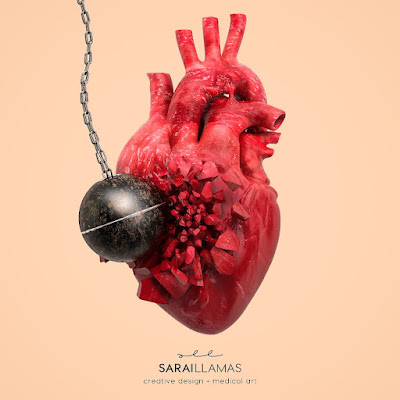Ilustración de Sarai Llamas
Gestionar la actual Atencion Primaria es imposible. Se puede decir con tecnicismos o florituras, ocupando libros blancos o dictámenes de sesudas comisiones. A mi tan solo tendrán que permitirme una frase y una breve argumentación de siete puntos.
1. Sin independencia de gestión real en los centros de salud no es posible una gestión óptima de los mismos.
2. El actual sistema impide y castiga el trabajo en equipo favoreciendo el individualismo y el corporativismo estamentario tóxico. Mientras se permita el “esto no es mi competencia” todo termina saturando al perfil profesional que las responde todas.
3. La gestión de “recursos humanos” es nefasta. La huida de profesionales y el progresivo aumento de puestos de “difícil cobertura” lo demuestran. Cualquier encuesta de satisfacción laboral entre sanitarios echa humo.
4. Si la insatisfacción de los profesionales roza máximos históricos poca buena voluntad se les podrá exigir.
5. Sin compromiso político del Estado y las Comunidades es imposible hacer reformas de calado. Los parches a cuatro años vista no solucionarán un derrumbe que lleva muchos años siendo avisado por los profesionales. La división administrativa en 17 unidades de gestión (sin coordinación ni dirección real) tampoco ayuda mucho.
6. En cinco años se jubilan un 25% de los facultativos, no se están tomando medidas serias para afrontarlo mientras se permite la huida de personal. Esto tendrá un enorme costo social que los actuales responsables no pagarán.
7. Si una pandemia como la actual, con la cantidad de muertos y de dolor producido, no ha servido para tomar conciencia de la necesidad de una reforma de la Atención Primaria nada lo hará.
Por estas razones no es fácil asumir lo que hay. Un panorama heterogéneo de centros de salud que funcionan, otros están al límite y, cada vez más, otros en llamas. Sería deseable una cartografía fiel en tiempo real, que nos defendiera con transparencia e información fidedigna de la espesa capa de humo que parece sumir la Atención Primaria en un extraño bosque neblinoso donde todos dan vueltas sin parar y nadie parece avanzar a ningún sitio.
Hay centros de salud que funcionan bien, tienen docencia, sus profesionales van a congresos y se siguen formando. Brindo por ellos. Pero hay otros en lo que la situación es muy dura con ausencias de larga duración no suplidas y acumulaciones de desgaste que rayan lo insano. Pensando en estos centros dejen de hacer planes, comisiones, libros blancos. Dejen de montar grupos de trabajo y reuniones por videoconferencia. Quien tenga responsabilidades de gestión que haga algo útil que ayude de verdad, si no es posible sigan en sus despachos, y que Dios les perdone.
Celebre gestor musical rodeado de ángeles.
Imposible management in Primary Care.
It is impossible to manage nos the Spanish primary care system. It can be said with technicalities or flourishes, occupying white papers or the opinions of brainy commissions. You will have to allow me just one sentence and a brief argumentation of seven points.
1. Without real management independence in the local health centres, optimal management of the health centres is not possible.
2. The current system prevents and punishes teamwork by favouring individualism and toxic corporatism. As long as "this is not my responsibility" is allowed, everything ends up saturating the professional profile that answers them all.
3. The management of "human resources" is disastrous. The flight of professionals and the progressive increase in "difficult to fill" posts are proof of this. Any survey of job satisfaction among healthcare professionals is a smoke and mirrors survey.
4. If the dissatisfaction of professionals is at an all-time high, little goodwill can be demanded of them.
5. Without political commitment from the State and the Communities, it is impossible to carry out far-reaching reforms. Four-year patches will not solve a collapse that professionals have been warning of for many years. The administrative division into 17 management units (without coordination or real direction) does not help much either.
6. In five years 25% of the doctors are retiring, no serious measures are being taken to deal with this while staff are being allowed to flee. This will have a huge social cost that the current managers will not pay.
7. If a pandemic like the current one, with the number of deaths and the pain it has caused, has not served to raise awareness of the need for a reform of primary care, nothing will.
For these reasons it is not easy to come to terms with what is there. A heterogeneous panorama of primary health centres that work, others that are on the brink and, increasingly, others that are on fire. It would be desirable to have a faithful mapping in real time, which would defend us with transparency and reliable information from the thick layer of smoke that seems to plunge Primary Care into a strange misty forest where everyone is going round and round and no one seems to be going anywhere.
There are health centres that work well, have teaching, their professionals go to congresses and continue to train. Here's to them. But there are others in which the situation is very tough, with long-term absences that are not made up for and accumulations of wear and tear that border on the unhealthy. Thinking of these centres, stop making plans, commissions, white papers. Stop setting up working groups and videoconference meetings. Whoever has management responsibilities should do something that really helps, if that is not possible, stay in their offices, and may God forgive them.
El silencio de los corderos.
初级保健中的消化不良和重度管理。
机器翻译,原谅错误。
管理目前的西班牙初级保健是不可能的。它可以用技术性或华丽的辞藻来表达,占据白皮书或脑力劳动委员会的意见。你必须允许我只说一句话,并对七点进行简要论证。
1.如果保健中心没有真正的管理独立性,就不可能实现保健中心的最佳管理。
2. 目前的制度通过支持个人主义和有毒的公司主义来防止和惩罚团队合作。只要允许 "这不是我的责任",一切最终都会使回答它们的专业资料饱和。
3. 对 "人力资源 "的管理是灾难性的。专业人员的逃离和 "难以填补 "职位的逐步增加就是证明。任何关于医护人员工作满意度的调查都是烟雾缭绕的调查。
4. 如果专业人员的不满情绪达到了前所未有的高度,那么对他们的善意要求就会很少。
5. 没有国家和社区的政治承诺,就不可能进行深远的改革。四年的修补不会解决专业人士多年来一直警告的崩溃问题。将行政部门分为17个管理单位(没有协调或真正的指导)也没有什么帮助。
6. 在五年内,25%的医生将退休,没有采取认真的措施来处理这个问题,而工作人员却被允许逃离。这将产生巨大的社会成本,目前的管理者不会支付。
7. 如果像目前这样的大流行病,以及它所造成的死亡人数和痛苦,还不能提高人们对初级保健改革必要性的认识,那就没有什么能提高了。
由于这些原因,要接受那里的东西并不容易。一幅异质的全景图,其中有运作良好的保健中心,也有濒临崩溃的保健中心,还有越来越多的保健中心正在燃烧。最好能有一个忠实的实时地图,这将为我们提供透明和可靠的信息,使我们摆脱厚厚的烟雾,这似乎使初级保健陷入一个奇怪的迷雾森林,每个人都在转来转去,似乎没有人去任何地方。
有一些保健中心运作良好,有教学,他们的专业人员去参加大会并继续培训。为他们干杯。但也有一些人的情况非常艰难,长期缺勤无法弥补,积累的磨损接近不健康的程度。思考这些中心,停止制定计划、委托、白皮书。停止设立工作组和视频会议。无论谁有管理责任,都应该做一些真正有帮助的事情,如果不可能,就留在办公室里,愿上帝原谅他们。





















